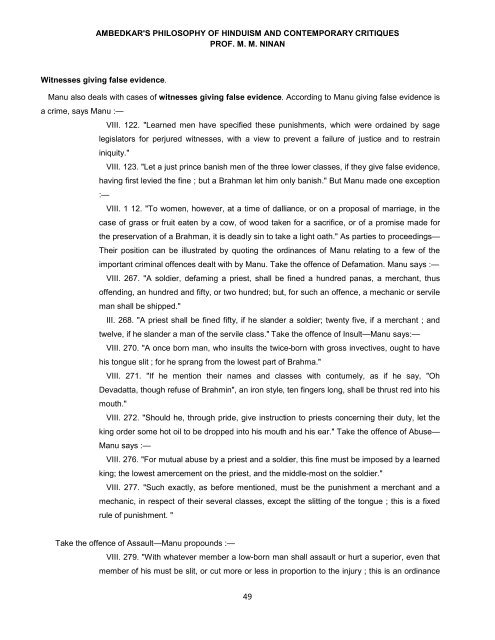Ambedkar-Philosophy of Hinduism
Create successful ePaper yourself
Turn your PDF publications into a flip-book with our unique Google optimized e-Paper software.
AMBEDKAR'S PHILOSOPHY OF HINDUISM AND CONTEMPORARY CRITIQUES<br />
PROF. M. M. NINAN<br />
Witnesses giving false evidence.<br />
Manu also deals with cases <strong>of</strong> witnesses giving false evidence. According to Manu giving false evidence is<br />
a crime, says Manu :—<br />
VIII. 122. "Learned men have specified these punishments, which were ordained by sage<br />
legislators for perjured witnesses, with a view to prevent a failure <strong>of</strong> justice and to restrain<br />
iniquity."<br />
VIII. 123. "Let a just prince banish men <strong>of</strong> the three lower classes, if they give false evidence,<br />
having first levied the fine ; but a Brahman let him only banish." But Manu made one exception<br />
:—<br />
VIII. 1 12. "To women, however, at a time <strong>of</strong> dalliance, or on a proposal <strong>of</strong> marriage, in the<br />
case <strong>of</strong> grass or fruit eaten by a cow, <strong>of</strong> wood taken for a sacrifice, or <strong>of</strong> a promise made for<br />
the preservation <strong>of</strong> a Brahman, it is deadly sin to take a light oath." As parties to proceedings—<br />
Their position can be illustrated by quoting the ordinances <strong>of</strong> Manu relating to a few <strong>of</strong> the<br />
important criminal <strong>of</strong>fences dealt with by Manu. Take the <strong>of</strong>fence <strong>of</strong> Defamation. Manu says :—<br />
VIII. 267. "A soldier, defaming a priest, shall be fined a hundred panas, a merchant, thus<br />
<strong>of</strong>fending, an hundred and fifty, or two hundred; but, for such an <strong>of</strong>fence, a mechanic or servile<br />
man shall be shipped."<br />
III. 268. "A priest shall be fined fifty, if he slander a soldier; twenty five, if a merchant ; and<br />
twelve, if he slander a man <strong>of</strong> the servile class." Take the <strong>of</strong>fence <strong>of</strong> Insult—Manu says:—<br />
VIII. 270. "A once born man, who insults the twice-born with gross invectives, ought to have<br />
his tongue slit ; for he sprang from the lowest part <strong>of</strong> Brahma."<br />
VIII. 271. "If he mention their names and classes with contumely, as if he say, "Oh<br />
Devadatta, though refuse <strong>of</strong> Brahmin", an iron style, ten fingers long, shall be thrust red into his<br />
mouth."<br />
VIII. 272. "Should he, through pride, give instruction to priests concerning their duty, let the<br />
king order some hot oil to be dropped into his mouth and his ear." Take the <strong>of</strong>fence <strong>of</strong> Abuse—<br />
Manu says :—<br />
VIII. 276. "For mutual abuse by a priest and a soldier, this fine must be imposed by a learned<br />
king; the lowest amercement on the priest, and the middle-most on the soldier."<br />
VIII. 277. "Such exactly, as before mentioned, must be the punishment a merchant and a<br />
mechanic, in respect <strong>of</strong> their several classes, except the slitting <strong>of</strong> the tongue ; this is a fixed<br />
rule <strong>of</strong> punishment. "<br />
Take the <strong>of</strong>fence <strong>of</strong> Assault—Manu propounds :—<br />
VIII. 279. "With whatever member a low-born man shall assault or hurt a superior, even that<br />
member <strong>of</strong> his must be slit, or cut more or less in proportion to the injury ; this is an ordinance<br />
49


















